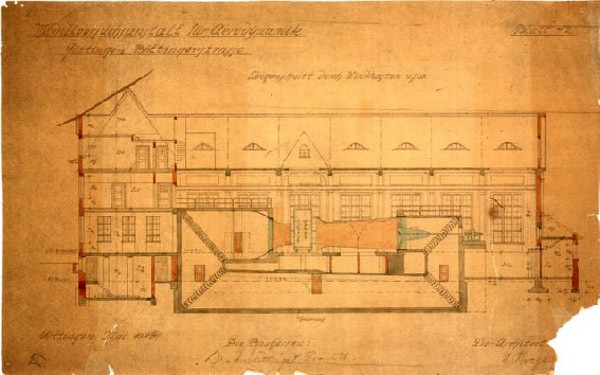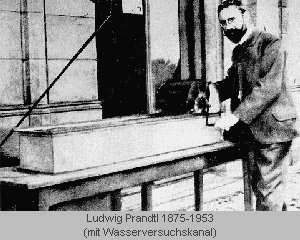

Kaiser Wilhelm Gesellschaft Organizations
Aerodynamic Testing Station (Göttingen e. V.) of the Kaiser Wilhelm Society. The testing unit Aerodynamische Versuchsanstalt (AVA) was formed in 1925 along with the KWI of Flow (Fluid Dynamics) Research. In 1937, it became the testing station of the KWG.
Kaiser Wilhelm Institute
The Kaiser Wilhelm Gesellschaft is a German entity formally known as the Kaiser-Wilhelm-Gesellschaft zur Förderung der Wissenschaften e. V. (Kaiser Wilhelm Society for the Advancement of Science). The Kaiser Wilhelm Society was the umbrella organization for the institutes, testing stations, and units spawned under its authority.
Founding
The Kaiser Wilhelm Gesellschaft (KWG, Kaiser Wilhelm Society) was founded in 1911. The purpose of the KWG was to promote the sciences in Germany, specifically by founding and maintaining research institutions independent from the state. The institutions were to be under the guidance of prominent directors, which included luminaries such as Walther Bothe, Peter Debye, Albert Einstein, Fritz Haber, and Werner Heisenberg; a board of trustees also provided guidance. Funding was ultimately obtained from sources internal and external to Germany. Internally, money was raised from individuals, industry, and the government, as well as through the Notgemeinschaft der Deutschen Wissenschaft (Emergency Association of German Science.). External to Germany, the Rockefeller Foundation made contributions.[1] [2] [3]
After World War II
By the end of World War II, the KWG and its institutes had lost their central location in Berlin and were operating in other locations. The KWG was operating out of its Aerodynamics Testing Station in Göttingen. Albert Vögler, the president of the KWG, committed suicide on 14 April. Thereupon, Ernst Telschow assumed the duties until Max Planck could be brought from Magdeburg to Göttingen, which was in the British zone of the Allied Occupation Zones in Germany. Planck assumed the duties on 16 May until a president could be elected. Otto Hahn was selected by directors to be president, but there were a number of difficulties to be overcome. Hahn, being related to nuclear research had been captured by the allied forces of Operation Alsos, and he was still interned at Farm Hall in England, under Operation Epsilon. At first, Hahn was reluctant to accept the post, but others prevailed upon him to accept it. Hahn took over the presidency three months after being released and returned to Germany. However, the Office of Military Government, United States (OMGUS) passed a resolution to dissolve the KWG on 11 July 1946. Meanwhile, members of the British occupation forces, specifically in the Research Branch of the OMGUS, saw the Society in a more favorable light and tried to dissuade the Americans from taking such action. The physicist Howard Percy Robertson was director of the department for science in the British Zone; he had a National Research Council Fellowship in the 1920s to study at the Georg-August University of Göttingen and the Ludwig Maximilians University of Munich. Also, Colonel Bertie Blount was on the staff of the British Research Branch, and he had received his doctorate at Göttingen under Walther Borsche. Among other things, Bertie suggested to Hahn to write to Sir Henry Hallett Dale, who had been the president of the Royal Society, which he did. While in England, Bertie also spoke with Dale, who came up with a suggestion. Dale believed that it was only the name which conjured up a pejorative picture and suggested that the Society be renamed the Max Planck Gesellschaft. On 11 September 1946, the Max Planck Gesellschaft was founded in the British Zone only. The second founding took place on 26 February 1948 for both the American and British occupation zones. The physicists Max von Laue and Walther Gerlach were also instrumental in establishing the Society across the allied zones, including the French zone.[4] [5]
Presidents
-
•Adolf von Harnack (1911 - 1930)
-
•Max Planck (1930 - 1937)
-
•Carl Bosch (1937 - 1940)
-
•Albert Vögler (1941 - 1945)
-
•Max Planck (16 May 1945 - 31 March 1946)
-
•Otto Hahn (1 April 1946 - 10 September 1946 in the British Occupation Zone)
Source: http://en.wikipedia.org/wiki
Additional history :
Some Myths Dispelled
Additional history :
Maps and Statistics
Link to :
Preview of the Album